of graduate employers say relevant experience is essential to getting a job with them
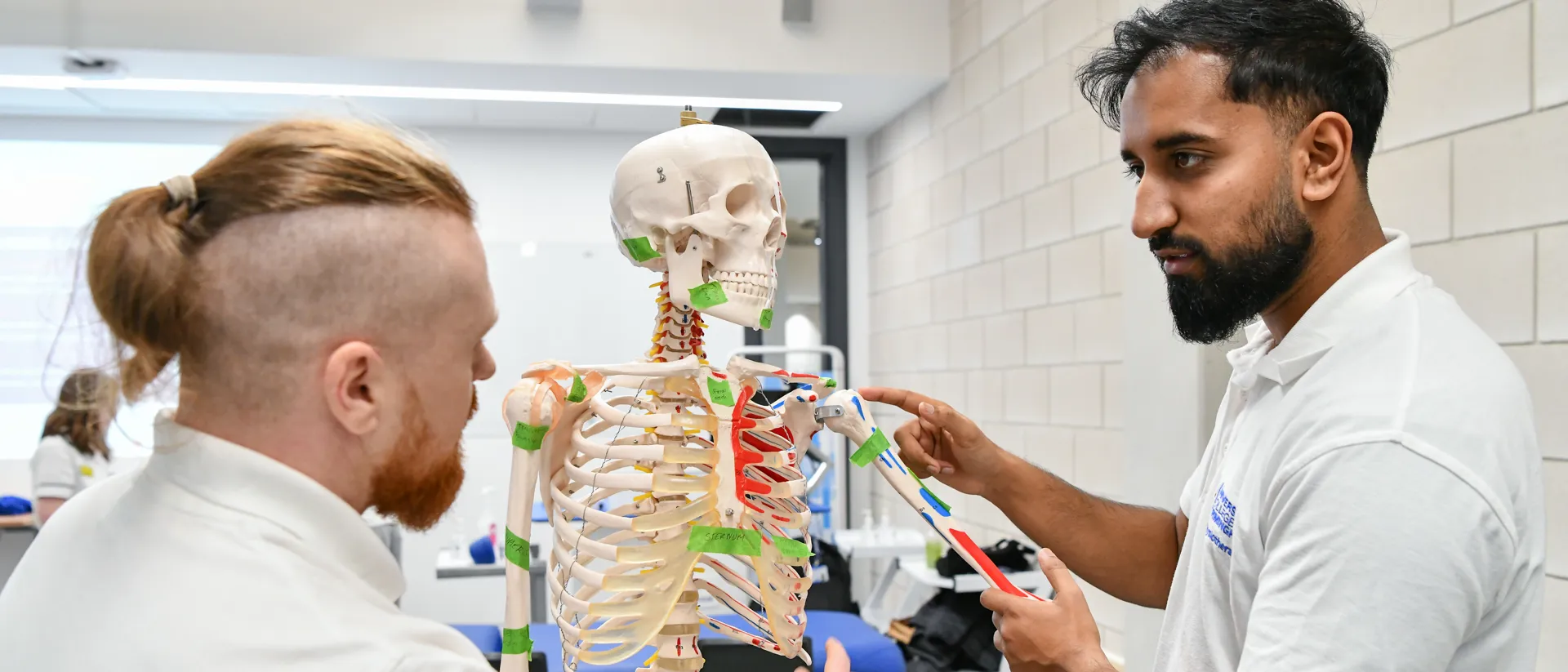
- University
- Undergraduate
- Courses
- Physiotherapy BSc (Hons)
Award
BSc (Hons)
Duration
3 years full-time
UCAS Code
B160
Placement
Please see placements section below
Entry
September
Fees
View fees

£44m invested in flagship facilities, including physiotherapy, to support your future career opportunities

We work with over 1,000 employers to find you the right work placement
Do you want a career where you help people every day? Whether supporting someone to walk again after surgery, recover from a sports injury, or manage a long-term condition, physiotherapists are there through some of life’s biggest challenges.
Our Physiotherapy degree is designed to help you build the skills and confidence you need to succeed, whatever your background. You’ll gain a strong understanding of the human body and learn how to assess, treat and support people of all ages and abilities. We’ll help you grow into a thoughtful, skilled practitioner who can adapt to complex situations and make a real impact.
You’ll get hands-on experience through placements in a variety of clinical, educational, leadership and research settings, and also have the opportunity to train in our new simulation suites, where you can practice in a safe, supportive environment.
After graduation, you’ll be eligible to register as a physiotherapist with the Health and Care Professions Council (HCPC) and join the Chartered Society of Physiotherapy (CSP), unlocking a wide range of career opportunities.
Financial help to study physiotherapy with us
- £5,000 free Cost of Living Allowance on us: for all full-time UK undergraduate students starting in September 2025
- An extra £5,000 a year from the UK government to support physiotherapist recruitment
This adds up to a potential £20,000 for free to support you in gaining your physiotherapy degree, helping to remove financial barriers to study.
Find out moreWhy should I choose this physiotherapy degree?
- INDUSTRY APPROVED – You will be able to apply for registration with the HCPC and for CSP membership when you graduate
- PRACTICE-BASED LEARNING – Experience the exciting and dynamic areas of the profession by undertaking 1,000 hours of practice-based learning across a broad range of settings
- PRACTICAL APPLICATION – Hone your practical skills in our state-of-the-art facilities, along with the chance to develop, advertise, manage and lead a ‘pop-up’ physiotherapy practice at the University
- EXPERT TEACHING – Get excellent support from our experienced academic lecturers and guest lecturers with clinical expertise in a variety of areas
- TOP LEVELS OF STUDENT SATISFACTION – More than 90% of students answered positively on questions relating to quality of teaching, support and development, representing a 2.5% increase on last year (National Student Survey 2025)
Our facilities
University College Birmingham offers a variety of cutting-edge facilities to support your physiotherapy training.
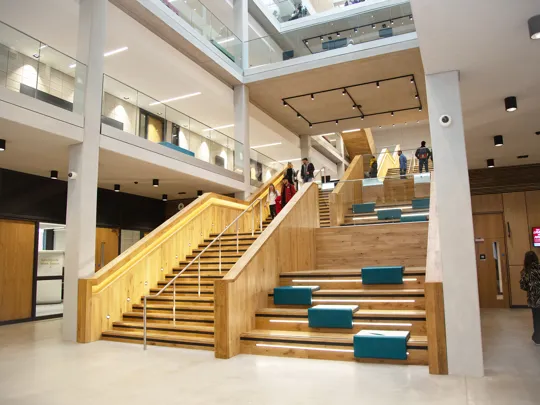
Our £44 million Moss House campus includes an exhibition space to showcase your work to assessors and prospective employers
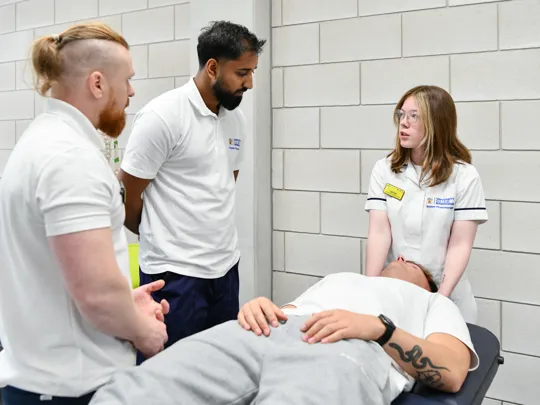
A wide variety of learning spaces, from specialist teaching spaces and clinical skills suites to interactive group working spaces
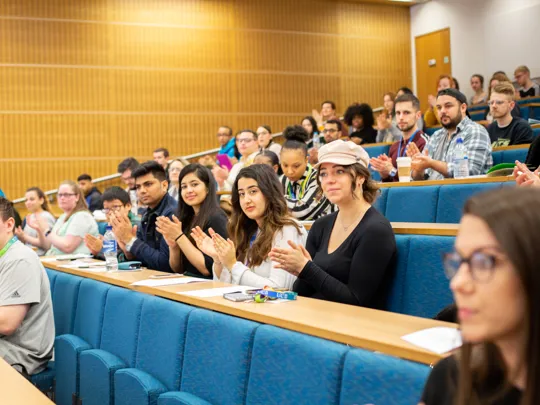
Our campus buildings feature lecture theatres equipped with the latest technology, as well as comfortable tutorial and seminar rooms and private meeting rooms

Our library facilities offer more than 50,000 print resources and over 60 million digital resources, with expert support from qualified library professionals and research specialists
Course breakdown
- Year 1
- Year 2
- Year 3
Modules
Human Anatomy and Physiology
The Human Anatomy and Physiology module serves as the foundation for understanding the structure and function of the human body. This module provides students with an in-depth exploration of anatomical structures, physiological processes, and their interrelationships relevant to physiotherapy practice. Through a combination of theoretical lectures, practical sessions, and interactive learning activities, students will develop a comprehensive understanding of the musculoskeletal, cardiovascular, respiratory, and nervous systems.
Introduction to Physiotherapy Practice
The "Introduction to Physiotherapy" module provides students with a foundational understanding of the role of physiotherapy in promoting health and well-being across the lifespan. Through a series of lectures, discussions, and practical exercises, students will explore various aspects of physiotherapy practice, including professional standards, health promotion strategies, and specialised areas of care such as pregnancy, paediatrics, aging population, mental health, and palliative care.
Principles of Assessment in Physiotherapy
The "Principles of Assessment in Physiotherapy" module provides students with a comprehensive understanding of the principles, techniques, and applications of assessment in physiotherapy practice. Through a combination of theoretical knowledge and practical skills, students will learn to assess major body systems including musculoskeletal, cardiovascular, respiratory, and neurological systems. Emphasis is placed on professionalism, effective communication, and ethical conduct throughout the assessment process. This module covers methods of assessment for multiple body systems. Delivered in a timely fashion with respect to Human Anatomy and Physiology, you will utilise your learning from that module in this one to allow you to assess body systems and structures. You will be taught and assessed on professionalism, safety, correct test performance, communication, handling, patient positioning, and outcome measure identification. This module will prepare you for more complex assessment techniques and pathology management at level 5.
Practice-based Learning 1
This module prepares you for practice as a professional in clinical environments. The module provides opportunity for you to build on the knowledge and skills developed in earlier modules and apply these skills in simulated case scenarios. You will also complete the required statutory mandatory training required for clinical practice including manual handling and basic life support. The module includes practiced based learning which may be within a health and social care setting. This experience will support your development of professional behaviours, communication skills, care, and compassion.
Modules
Neurological Studies
The Neurological Studies module provides students with an in-depth exploration of neurological conditions commonly encountered in physiotherapy practice. This module focuses on evidence-based treatment and management strategies for neurological disorders, for example stroke, multiple sclerosis (MS) and Parkinson's disease (PD). Through a combination of theoretical lectures, practical workshops, case studies, and analysis of research literature, students will develop the knowledge, skills, and clinical reasoning abilities necessary to deliver effective physiotherapy interventions for patients with neurological conditions. Emphasis is placed on understanding the neurophysiological basis of these conditions, conducting comprehensive assessments, and implementing evidence-based treatment plans to optimise patient outcomes and functional independence.
Cardiovascular and Respiratory Studies
This module will review common cardiovascular and respiratory pathologies and conditions, relating to health inequalities in the communities affected and the management for those affected. Accompanying this, you will gain knowledge and insight into cardiovascular and respiratory anatomy, whilst learning the key skills in assessment and management of the conditions.
Musculoskeletal Studies
Our Musculoskeletal Studies module at Level 5 offers students an in-depth exploration of the musculoskeletal system, its function, and its clinical relevance in physiotherapy practice. Through a blend of theoretical learning and practical application, students will develop a comprehensive understanding of musculoskeletal anatomy, assessment, and management techniques. Reflective practice is fostered to ensure students analyse and learn from their own learning.
Research for Physiotherapists
This module builds upon the skills acquired from the first-year modules delving deeper into the research process and develop your research skills through a range of quantitative and qualitative methods. The process of data collection and analysis allows you to develop your research techniques specific to the physiotherapy profession. This module aims to develop analytical thought through a range of research processes, allowing you to increase your appreciation of scientific and clinically based research methods. Furthermore, this module aims to develop your critical thought of current research and practice and consider how the digital future will change the experiences of the service user.
Practice-based Learning 2
Practice Based learning 2 enables you to experience the role of physiotherapists first hand whilst developing professional, clinical, and interpersonal skills. You will learn practical and clinical skills through a range of practice-based learning activities and assessed placement experiences.
Modules
Advancing Practice in Physiotherapy
The Advanced Physiotherapy Practice module is designed to equip students with the advanced knowledge and skills required to effectively manage complex patient presentations across a range of physiotherapy practice areas. Building upon foundational physiotherapy principles, this module explores advanced concepts in cardiorespiratory, neurological, and musculoskeletal physiotherapy, with a focus on understanding the interaction between multiple comorbidities and their impact on patient management. Through a combination of theoretical learning, practical skills and clinical case studies, students will enhance their clinical reasoning abilities and proficiency in delivering evidence-based interventions to optimize patient outcomes.
Research for Allied Health Professionals
This is a key project which will develop independent learning, problem solving, analysis and data presentation skills. You will deepen your knowledge in a selected area of your choice and relating to your physiotherapy practice. This may be a review of a health care service, a clinical audit, or a number of journal submissions on the same topic. All methods are supported by an additional poster presentation.
Practice-based Learning 3
Practice Based Learning 3 enables you to experience the role of physiotherapists first-hand whilst developing professional, clinical, and interpersonal skills. This is achieved through a range of practice-based learning activities and placements across diverse health and social care settings and in the university.
The modules listed above for this course are regularly reviewed to ensure they are up to date and informed by industry as well as the latest teaching methods. On occasion, we may need to make unexpected changes to modules – if this occurs, we will contact all offer holders as soon as possible.
Entry requirements
Entry requirements
Access to Higher Education Diploma: 120 UCAS Tariff points including a minimum of 30 Level 3 credits at Distinction in one of the following subjects: health science, health professional, biomedical science, biosciences, social science and health, science, science for health practitioners.
A-levels: Grade profile of BBB, including grade B in biology or physical education.
T-levels: A T-level in Science with an overall Merit grade.
BTEC: Grade profile of DDM from one of the following subjects:
- Applied science, applied biomedical science, applied human biology.
- Sports and exercise science, health and social care - These two subject areas must include an anatomy and physiology unit.
DDM can be achieved from either an Extended Diploma or a combination* of smaller BTEC qualifications.
*If you are not studying an Extended Diploma in one of the related course subjects above, we will also consider 6, 9 or 12 Unit BTECs in the subject areas stated providing you are also studying additional level 3 qualifications that would sufficiently meet our tariff requirements.
Irish Leaving Certificate: Grade profile of three subjects at H2 including biology and one subject at H3. The remaining tariff points can be made up of Higher or Ordinary subject grades.
Tariff: Other Level 3 qualifications are accepted at University College Birmingham for entry and a minimum of 120 UCAS Tariff points will be required from a vocationally relevant subject matter. To find out if your qualifications are suitable to apply, please contact our Admissions team on 0121 604 1040 or complete our enquiry form here.
GCSEs: GCSE/IGCSE maths and English language grades 9-4 (grade A*-C) or equivalent. GCSE equivalent qualifications include Functional Skills Level 2, Key Skills Level 2 or Learn Direct Level 2.
Irish Leaving Certificate grades of the following will be accepted as GCSE equivalencies in the subjects above:
- O1-O4 or A1-C3 (Ordinary Level)
- H1-H7 or A1-D3 (Higher Level)
We would expect GCSE qualifications to have been achieved prior to applying for this course. However, we will consider applications from students with one GCSE qualification pending.
Students must also complete an Enhanced Disclosure and Barring Service (DBS) check. The University will coordinate and fund the completion of the DBS check. Further information is available regarding the DBS check – the requirements prior to entry onto the course can be found here and a summary of the documents required for the application process can be found here.
Graduate Entry: A 2:2 or above in a related area will also be considered.
If you have any questions about applying to University College Birmingham for this course, please complete our enquiry form here.
Interview
The Admissions team will use the entrance criteria, as well as your personal statement, reference and work experience information, to shortlist candidates for interview.
Successful applicants will be invited to an interview which will assess your motivation and understanding of the role of a physiotherapist. We use values based recruitment to explore if your values and behaviours align with the values of the NHS Constitution. Further details of the process will be sent to you if you are shortlisted.
Non-academic entry requirements
We understand that not everyone has the same opportunities, and getting work experience or shadowing a physiotherapist isn’t always easy. If you can, we encourage you to try and gain some hands-on experience - volunteering or observing in a healthcare setting can give you a great insight into what being a physiotherapist is really like.
However, if you haven’t had the chance to do this yet - or your placement is planned but hasn’t started—please don’t worry. This won’t stop you from applying. What’s most important is that you show us you’ve taken the time to explore the profession and understand what it involves.
There are plenty of other ways to do this. You could:
- Speak to a physiotherapist about their role
- Read about real-life experiences in physiotherapy
- Explore professional websites like The Chartered Society of Physiotherapy (CSP) or NHS Health Careers
Pre-course health and immunisation requirements
Students must complete a Pre-course Health Questionnaire and meet the Immunisation Requirements.
International students
For entry requirements for EU and international students, please visit the Country Specific Information page.
English Requirements: Overall IELTS score of 7.0 – a minimum of 7.0 in reading, listening and speaking, and a minimum of 6.5 in writing.
Key information
Teaching and assessment
Note: Indicative information only – actual timetables and assessment regimes will be issued at your induction.
Teaching
Learning strategies include:
- Practical lessons
- Small seminars
- Self-directed study
- Placement learning opportunities
Assessment
Assessment formats include:
- Practical exams
- OSCEs (Objective Structured Clinical Examinations)
- Written multiple choice questions
- Written assignments
Our teaching and assessment is underpinned by our Learning and Teaching Strategy 2025-2030.
Timetable
Whilst your lessons will be timetabled into 2-3 days a week, it is worth noting that your course includes regular placements in addition to these hours.
Tuition fees for home students
If you are a home student enrolling on a bachelor's or foundation degree course at University College Birmingham, the 2025/2026 academic year tuition fee for full-time study is £9,535. For part-time study, the fee is £4,767.50.
Tuition fees for international students
If you are an international student (or have been fee assessed as an international fee payer) and are enrolling on a full-time [Band 1] bachelor's degree course in 2025/2026, the fee for the academic year will be £16,000. If you complete a placement year, there will be an administration fee of £500 for a full year or £250 for a half-year placement.
Uniform and kit costs
Physiotherapy students are required to wear uniforms on placements (trousers and tunic). An initial set of uniform is provided.
Additional costs
The Chartered Society of Physiotherapists student membership costs £41.26 and can also be paid for through our Kick-Start scheme, as well as core reading books from the course reading list.
Additional course costs may include travel expenses to and from placements, parking charges and the occasional overnight accommodation costs for placements that are further away from Birmingham. To meet these course costs, student physiotherapists can apply for the NHS BSA Learning Support Fund.
All student physiotherapists are entitled to apply for £5,000 per year. There are additional means-tested funds available for students with dependants or in financial hardship situations.
Funding for physiotherapy students
On top of £5,000 free Cost of Living Allowance you get from us, additional support from the UK government is available to physiotherapy students, which includes a non-repayable payment of £5,000 to eligible students each academic year, and additional payments worth up to a total of £3,000 to help students cover childcare costs. Find out more.
Students who already have a degree, but undertake our BSc (Hons) in physiotherapy as an additional degree, are able to apply to access a student tuition fee and maintenance loan through Student Finance England.
Free £5,000 cost of living allowance
We are committed to supporting students who may be facing financial challenges due to the rise of living costs. If you are a full-time undergraduate student starting your course in February or September 2026, with home fee status and plan to pay your fees using a student loan, you’ll be eligible a £5,000* Cost of Living Allowance.
Further information and frequently asked questions can be found here: £5,000 Cost of Living Allowance
*If you are studying a two-year foundation degree, you will receive £2,000 in instalments each year of your course. If you decide you'd like to top up to a full BA or BSc (Hons) at the end of your foundation degree, you will also be entitled to the £1,000 in the third year.
Kick-Start Scheme
As a new student studying this course full-time, you will receive £300 per year through our Kick-Start Scheme (UK students only, eligibility criteria applies). This scheme will support your studies and future career by contributing to course-related materials, uniform or selected items on campus. You may also qualify for an additional £500 per year.
Find out more about the Kick-Start Scheme here.
Work placements
Practice-based learning is vital for gaining real-life experience and for building your confidence and skills before you finish your course – and may even lead to a job when you graduate.
Our BSc Physiotherapy course requires you to accrue 1,000 hours of practice-based learning activities by the end of your degree.
Work alongside experts in your sector
A snapshot of some of the employers we have worked with:
- University Hospitals Birmingham NHS Foundation Trust
- Birmingham and Solihull Mental Health NHS Foundation Trust
- Birmingham Community Healthcare NHS Foundation Trust
- Birmingham Women's and Children's NHS Foundation Trust
- Worcester Acute Hospitals NHS Trust
- Private physiotherapy providers across a range of specialities
- Chartered Society of Physiotherapy

Our contemporary curriculum will develop graduate physiotherapists with the skills that they need to work in changing and challenging healthcare environments. On this course, you will be taught by skilled physiotherapists and lecturers and supported in your placements by experienced physiotherapy practice educators, preparing you for a long and rewarding career.
Carla Phillips Head of Department - Health & Nutrition
Career opportunities
The example roles and salaries below are intended as a guide only.
NHS Physiotherapist
From £33,834 to £37,796
Senior NHS physiotherapist
From £38,682 to £46,580
Sports physiotherapist
Average salary: £23,000 – £45,000
NHS Team leader
From £47,810 to £54,710
Want to take your studies to the next level? Completing the BSc (Hons) degree will enable you to move onto our postgraduate courses such as Enterprise Management MSc/PGDip.
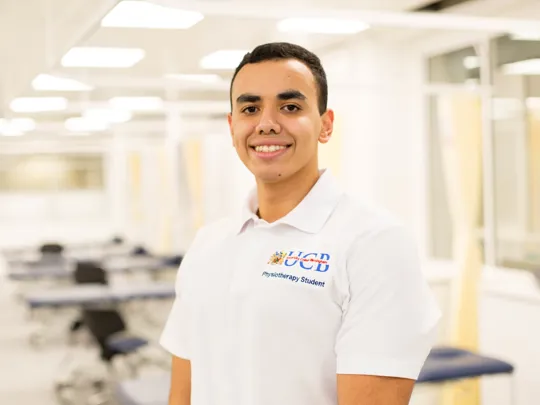
Kevin’s Story
Kevin picked University College Birmingham for his Physiotherapy degree after a twist of fate inspired him to pursue a rewarding career in rehabilitation
What our students on this course say...
94%
of students on this course say that teaching staff are good at explaining things
90%
of students at the University say their course is intellectually stimulating
85%
of students at the University say staff often make subjects engaging
*National Student Survey (NSS) 2023
Course statistics
BSc (Hons)
Meet your lecturers
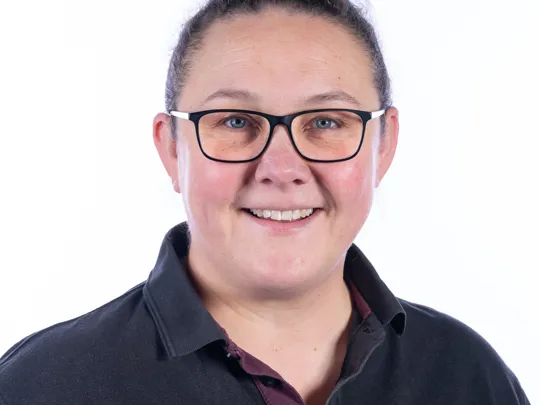


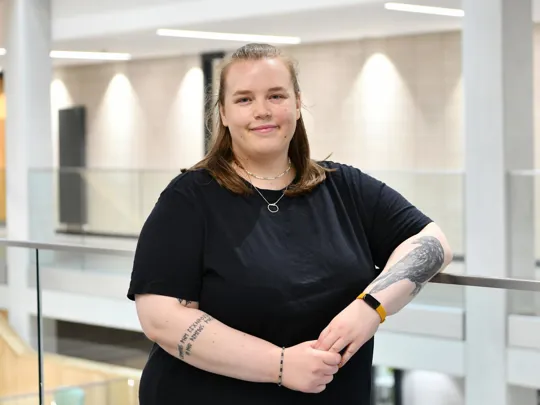

Other courses you may like
Sports Therapy BSc (Hons) / FdSc
Want to work with professional athletes or treat patients in a sports injury clinic? This specialist course will arm you with advanced practical sports therapy skills and scientific knowledge, with excellent placement opportunities to test your training in the real world.
Adult Nursing BSc (Hons)
Dream of becoming a nurse? Featuring multiple placements and supported by our outstanding facilities, this award-winning course will prepare you for a rewarding career working in adult nursing, enabling you to become a Registered Nurse with the NMC upon graduation.
Health and Social Care BSc (Hons)
Discover how you can make a difference to the lives of many different people in their time of greatest need. This course will prepare you for working in the dynamic health and social care sector, with weekly placement experience and additional qualifications available.
